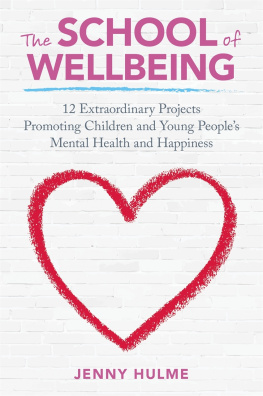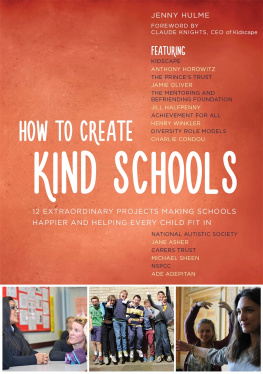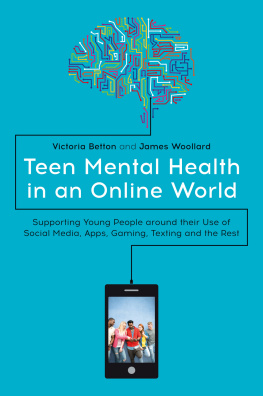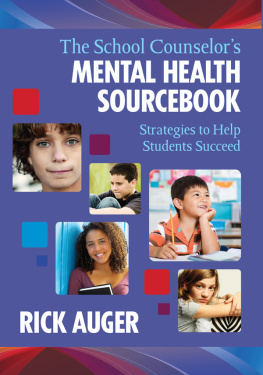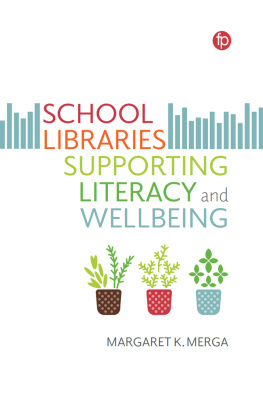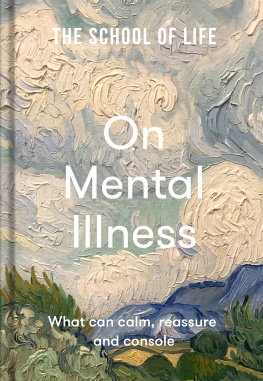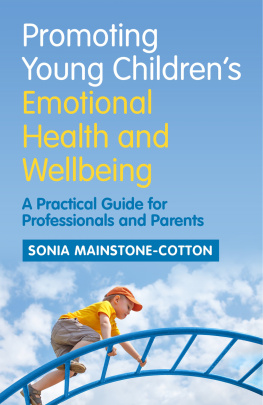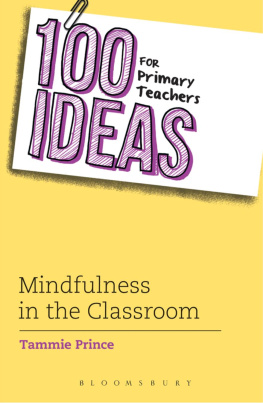
by the same author
How to Create Kind Schools
12 extraordinary projects making schools happier and helping every child fit in
Jenny Hulme
Foreword by Claude Knights, CEO of Kidscape
ISBN 978 1 84905 591 8
eISBN 978 1 78450 157 0
of related interest
Using Poetry to Promote Talking and Healing
Pooky Knightsmith
ISBN 978 1 78592 053 0
eISBN 978 1 78450 323 9
Self-Harm and Eating Disorders in Schools
A Guide to Whole-School Strategies and Practical Support
Pooky Knightsmith
ISBN 978 1 84905 584 0
eISBN 978 1 78450 031 3
LEGO -Based Therapy
How to build social competence through LEGO -based Clubs for children with autism and related conditions
ISBN 978 1 84905 537 6
eISBN 978 0 85700 960 9
Starving the Exam Stress Gremlin
A Cognitive Behavioural Therapy Workbook on Managing Exam Stress for Young People
Kate Collins-Donnelly
Part of the Gremlin and Thief CBT Workbooks series
ISBN 978 1 84905 698 4
eISBN 978 1 78450 214 0
Thats So Gay!
Challenging Homophobic Bullying
Jonathan Charlesworth
ISBN 978 1 84905 461 4
eISBN 978 0 85700 837 4
The SCHOOL of
WELLBEING
12 Extraordinary Projects
Promoting Children and Young Peoples
Mental Health and Happiness
JENNY HULME

Jessica Kingsley Publishers
London and Philadelphia
First published in 2017
by Jessica Kingsley Publishers
73 Collier Street
London N1 9BE, UK
and
400 Market Street, Suite 400
Philadelphia, PA 19106, USA
www.jkp.com
Copyright Jenny Hulme 2017
Front cover image source: iStockphoto.
All rights reserved. No part of this publication may be reproduced in any material form (including photocopying, storing in any medium by electronic means or transmitting) without the written permission of the copyright owner except in accordance with the provisions of the law or under terms of a licence issued in the UK by the Copyright Licensing Agency Ltd. www.cla.co.uk or in overseas territories by the relevant reproduction rights organisation, for details see www.ifrro.org. Applications for the copyright owners written permission to reproduce any part of this publication should be addressed to the publisher.
Warning: The doing of an unauthorised act in relation to a copyright work may result in both a civil claim for damages and criminal prosecution.
Library of Congress Cataloging in Publication Data
Names: Hulme, Jenny, author.
Title: The school of wellbeing : 12 extraordinary projects promoting children
and young peoples mental health and happiness / Jenny Hulme.
Other titles: School of well-being
Description: London : Jessica Kingsley Publishers, 2017. | Includes index.
Identifiers: LCCN 2016038901 | ISBN 9781785920967 (alk. paper)
Subjects: LCSH: Students--Mental health. | School mental health services. |
Well-being.
Classification: LCC LB3430 .H85 2017 | DDC 371.7/13--dc23 LC record available at https://lccn.loc.gov/2016038901
British Library Cataloguing in Publication Data
A CIP catalogue record for this book is available from the British Library
ISBN 978 1 78592 096 7
eISBN 978 1 78450 359 8
Acknowledgements
With huge thanks to everyone who shared their experience and expertise with me while I was writing these stories. Your commitment to a better, healthier and happier education system (and the wellbeing of every single child) completely inspired me. Also to Mark Blayney for his invaluable advice, to my editors at Jessica Kingsley Publishers for getting behind this book and to my children, Scott and Eleni, for helping me to write it.
Contents
Introduction
Were in a packed theatre, giving a spontaneous standing ovation to Ruby Wax at the end of her show Frazzled . Theres nothing like being part of a crowd like this to remind us that there is, finally, a new way of thinking about mental health. Dubbed the poster girl of the subject (and shes picked up an OBE for services to it), the actor and author wryly confesses at the start of her one-woman show that shes made a new career out of her experience of depression, before candidly and comically sharing her exploration of it.
During the closing part of the event Wax invites the audience into the debate and a student stands up and asks her what she thinks can be done about the problems in schools; in particular the pressures on students and the mental health problems they exacerbate. When Wax asks the audience if there is anyone who doesnt recognise the problem were seeing in education and believes there is no need for change, no one in the 3000 plus crowd raises their hand.
Many, though, might be left wondering why the student in question felt compelled to get to her feet. Why, when this subject is now the stuff of sell out shows, of magazine articles, the focus of bestselling books and even Royal patronages (at the time of writing the Duke and Duchess of Cambridge and Prince Harry are joining forces to launch the Heads Together Campaign to help destigmatise the issue), are we not seeing the real benefits in the classroom?
There can be no doubt theres an appetite for change. Consider the 39 million plus hits on TED when Sir Ken Robinson suggested dance be given the same priority as maths, or the huge number of YouTube viewings of Sir Anthony Seldon talking about the role of education in building happier societies. Look at the growing crowd (most teachers and many business leaders, childrens charities and pupils) behind the campaign to make PSHE the subject that most directly promotes emotional wellbeing statutory. So why is there still sluggishness on this issue? Never mind university, says Ruby Wax. I always wonder what institutions they think these kids will be in when theyre 40?
As slowly and surely as were seeing the stigma around mental health being put aside, we are seeing the gaps that need to be filled in young peoples education so they can build their emotional wellbeing for the future. A golden opportunity for change.
This change comes not before time. Schools even if they havent properly understood all the issues and the impact they have now know that in an average classroom ten young people will have witnessed their parents separate. One will have experienced the death of a parent. Seven will have been bullied. And research suggests one in four young people in secondary school will, at some point, have been severely neglected, physically attacked or sexually abused.
Meanwhile these children have seen their families go through a recession and are themselves facing bleaker job prospects and the impact of round the clock social media, which all exacerbate existing problems, creating a perfect storm that affects them as much as it affects their parents and carers. Teachers are aware that the growing number of school refusers may simply end up at home, unable to access the support they need to get back into school. Despite this, many feel unable to do more than send a letter home reminding families about attendance. They are no longer surprised to learn that rates of depression and anxiety among teenagers have increased by 70 per cent in the past 25 years Meanwhile, the charity Young Minds has talked about the number of calls they get to their helplines as a result of exam pressure.
Rather than an en masse shaking of heads and wringing of hands in staff rooms about the troubles children are bringing into school (as may have been the case not so long ago), schools have learned that the years when children are in their care are the years when mental health develops, and patterns are set for the future. They recognise that resilience is something schools can help their pupils develop and that its not about ridding life of fears, anxieties and challenges, but about building something strong in children and teenagers so they can understand lifes problems and themselves better. They know education can help do that.
Next page
